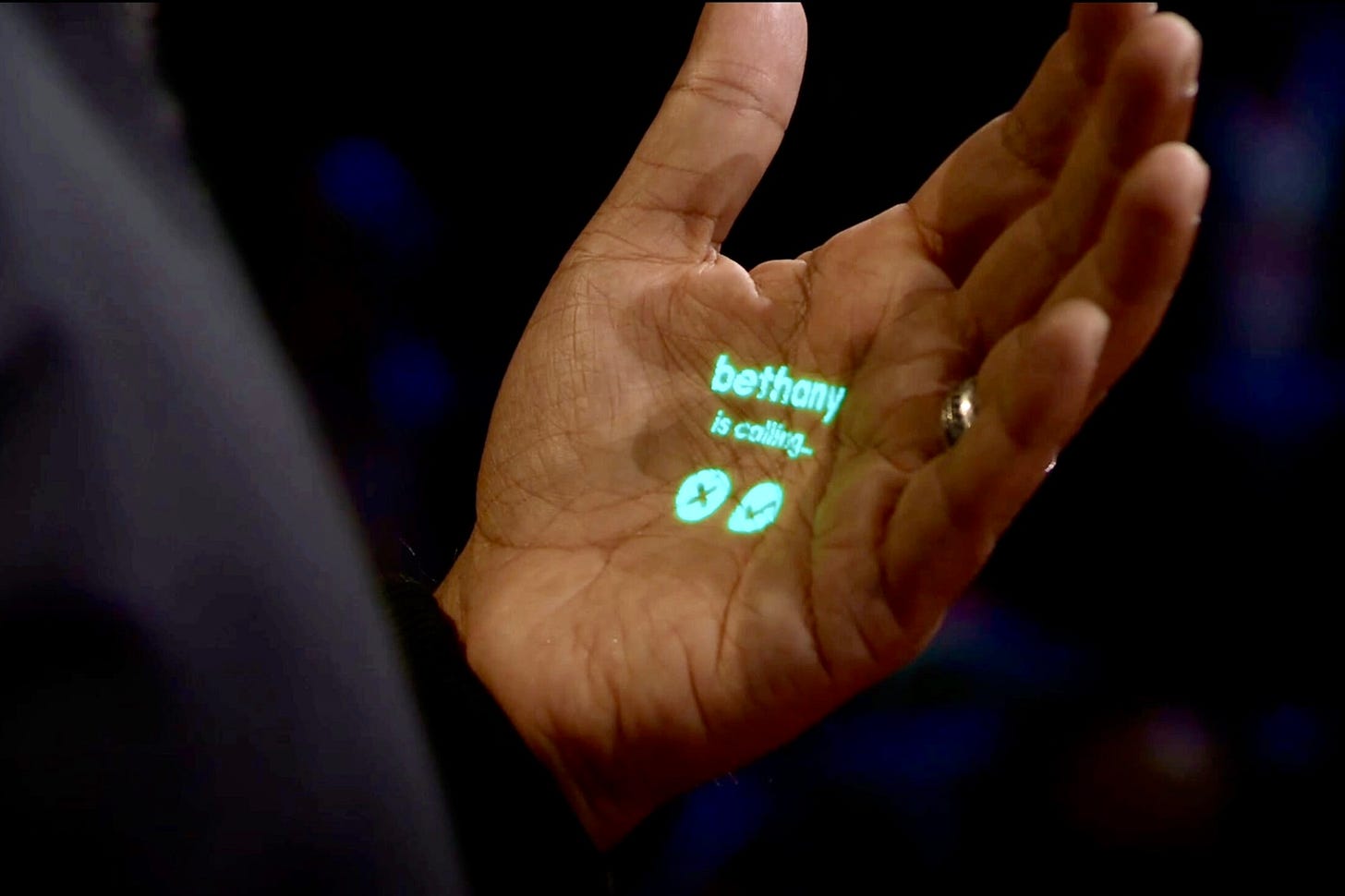Humane is projecting
A buzzy startup breaks cover with a bold, dubious vision
Welcome back to Multicore for Tuesday, April 25th.
Humane is a secretive startup founded by former Apple executives Imran Chaudhri and Bethany Bongiorno. Although scattered rumours and details of its first hardware product have been floating around the internet for a while, Chaudhri showed it off in public for the first time through a TED talk a few days ago.
The full talk isn't available to watch yet, but Inverse got hold of some clips. It is, as expected, a small device that you clip or pin to your clothing, housing a built-in camera, a speaker, and a laser projector. It doesn't yet have a name, a release timeframe, or a price.
Last October, however, Chaudhri said that Humane would launch "the world's first device built from the ground up for AI" this year. (He also said "the smartphone is dead", just to keep expectations low.)
Here are some use cases for the Humane device that Chaudhri demonstrated at his TED talk:
Receive a phone call and raise your hand to see the caller's name projected on it along with typical accept/reject "buttons". The projected text is bright green monochrome. It's not clear how Chaudhri actually takes the call — he doesn't press any buttons, but he does say "Sorry, this is my wife, I'm gonna have to get this".
On-the-fly translation using an AI speech model to speak other languages — in this case French — with the user's "own emotion and own voice”, as Chaudhri puts it.
A basic catch-up summary of things you may have missed since you last checked in. The output in this example was "Patrick is coming to tomorrow's design meeting, Bethany wants to move next week's dinner, and Oliver is asking about soccer this weekend". The information is pulled from things like emails and calendar invites.
Camera-based object or product recognition, where Chaudri holds up a chocolate bar in front of him and asks "Can I eat this?", to be met with the response "A Milky Bar contains cocoa butter, your intolerance. You may want to avoid it."
Humane's whole deal, based on its lofty website copy and a promotional video called "Change Everything" released last year, is that people spend too much time looking at screens — smartphones, VR headsets, or otherwise. I'm not unsympathetic to that viewpoint, and some of the demonstrated features do look neat.
But the thing that really gives me pause about this Humane device is Chaudhri's insistence that it's independent from the smartphone, or even a replacement for it. If it works as well as I can possibly imagine, it still wouldn't come close to replicating the functionality that people now rely on having in their pockets. Right now, it doesn't look like it even replicates the functionality of something like an Apple Watch. If you're still going to be carrying around a phone — and let's be real, you are — how is this an improvement on that?
Chaudhri doesn't go out of his way to show off the Humane device's actual size, but it sure looks like he's wearing a jacket with a custom pocket for it to sit in. I'm struggling to see a scenario where a wearable device with enough battery capacity to power a projector, a camera, and a speaker would be less obtrusive than a smartwatch. This is the kind of thing you'd have to think about orienting your wardrobe around.
Humane can't be a pure hardware play, because nothing about this device would be all that difficult to replicate by competitors. The focus on AI features, meanwhile, doesn't seem like something where a company like this could hold its advantage for long. Chaudhri and Bongiorno could be betting on their considerable experience with UX and design as a meaningful differentiator. I don't doubt that they have a bunch of great ideas in this regard, but nothing that's been shown off so far demonstrates much of that.
Maybe the product is still years away and they're worried about being copied. But that brings me to another red flag — Humane's cryptic marketing approach. I'm reminded of how for years venture capitalists would talk about Magic Leap's tech demo as one of the most mind-blowing things they'd ever seen, yet the company wouldn't ever show it to journalists or anyone else. The first time it did, it was through a maddeningly vague hype piece in Wired. Years later, the product was unveiled for real and it was... a reasonably cool AR headset, better than competitors in some ways and worse in others. Magic Leap still has some clever enterprise applications, and maybe its secretive approach helped it raise VC funding, but I don't think the hushed conversation of its world-changing potential did it many favours when it was time to show its work.
I'm interested in what Humane's doing, and I hope they show it off properly soon. For now, though, I continue to believe that the smartphone is probably not dead.




